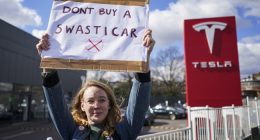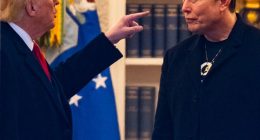Who is Keir Starmer lying to? Last week it appeared to be hungry school kids.
Over the past few months, a campaign backed by Labour MPs, mayors and unions seemed to be moving their party towards a policy of free school meals for all. It was widely believed that Starmer was supportive, especially after his full-throated backing for footballer Marcus Rashford’s activism on the issue during the pandemic.
‘The loss of free school meals risks millions of children going hungry, and for some this means missing their only hot meal of the day,’ Labour’s leader had raged. But then he suddenly snatched the plate away. ‘This is not Labour policy and we have no plans to implement it,’ a Labour spokesman announced.
It wasn’t the only significant announcement of the week. At around the same time Starmer was revealing his plan to take food from the mouths of children, Rachel Reeves was popping up to explain how she intended to stuff gold into the mouths of the global IT giants.
In 2021, Reeves unveiled a proposal to increase the levy paid by tech firms operating in the UK from two per cent to ten per cent – a move that would have raised £3 billion a year. But now she was scrapping it. ‘We have no plans to raise digital services tax in government,’ said a spokesman.


Who is Keir Starmer lying to? Last week it appeared to be hungry school kids
There are two explanations for this major shift in fiscal and social policy. The first is that it reflects precisely how Keir Starmer and his party intends to govern. Schoolchildren will be left with empty bellies. Foreign tech moguls will be allowed to retain their windfalls. Profits before pre-teen protein.
Or alternatively, this is basically just a smokescreen. Labour’s leader is secretly planning to be an old-school redistributor. He is preparing to tax big business and the wealthy, and use the proceeds to pump cash back into crumbling public services. But he doesn’t want anyone to know it yet.
According to Labour advisers, we were supposed to be getting a clear solution to this political mystery by now. The strategy was simple. Starmer would introduce himself to the British people. He would demonstrate why the Tories were no longer fit for office. And then he would gradually set out the policies that would define his programme for government.
Yet precisely the opposite is happening. The closer Starmer gets to Downing Street, the more desperate he seems to be to conceal what will actually happen if he’s elected. Every week another policy is abandoned or neutered. Nationalisation of mail, energy and water. The ending of NHS outsourcing. Abolition of Universal Credit. The scrapping of tuition fees. Abolition of the Lords.


The closer Starmer gets to Downing Street, the more desperate he seems to be to conceal what will actually happen if he’s elected
Talk to Starmer’s allies and they claim this is simply smart politics. ‘Keir’s just being prudent,’ one Shadow Minister told me. ‘He’s not going to give the Tories an easy target. He’s aware he can afford to be more radical in government than he can in opposition.’
It’s a neat analysis. But what Labour MPs frame as prudence is just deceit. Starmer has decided his route to securing power lies in pulling the wool over the eyes of the electorate. The only question is precisely which section of the electorate it is he’s trying to dupe.
Take his Brexit policy. Last month, Starmer enraged Remainers by announcing he would lead a government with the ‘vision and focus’ to ‘make Brexit work’.
Tony Blair’s former spin-doctor, pro-EU ultra Alastair Campbell, demanded the slogan should be ‘put in the bin’.
Then last week, The New Statesman, Labour’s in-house magazine, reported that behind the scenes Starmer’s stance was shifting. Labour Remainers were now ‘being given private assurances that the party will make significant steps towards reversing the damage of Boris Johnson’s deal,’ it reported.
Though again, there was uncertainty. ‘We just don’t know yet if we are being led up the garden path,’ admitted one pro-EU figure. Neither do the British people. And they won’t be let into the secret until Starmer arrives in Downing Street.
Read Related Also: Family of Ellen Greenberg stabbed 20 times in a ‘suicide’ demand Philadelphia mayor reopen the case
Similar mendacity surrounds his £28 billion green investment plan. For the past three years, this had been hailed as Labour’s flagship policy. Until a fortnight ago, when Rachel Reeves announced it was being scaled back.
‘No plan can be built that is not a rock of economic and fiscal responsibility… I will never play fast and loose with the public finances,’ she pledged.


Last month, Starmer enraged Remainers by announcing he would lead a government with the ‘vision and focus’ to ‘make Brexit work’.


Tony Blair’s former spin-doctor, pro-EU ultra Alastair Campbell, demanded the slogan should be ‘put in the bin’
Yet no sooner had she made her steely commitment to fiscal probity, than her colleague Ed Miliband began roaming across social media, taking a blowtorch to it. ‘Some people don’t want Britain to borrow to invest in the green economy. They want us to back down,’ he proclaimed. ‘Keir, Rachel and I will never let that happen. Britain needs this £28 billion-a-year plan and that is what we are committed to.’
But again, precisely which Keir is Miliband referring to? Because at the moment his leader seems intent on adopting more crowd-pleasing personas than Sacha Baron Cohen. There’s the Starmer who believes the Brexit debate has now been settled. But there is also the Starmer who secured the Labour leadership by pledging to ‘defend free movement as we leave the EU’.
There’s the Starmer who vowed to ‘increase income tax for the top five per cent of earners’. And there’s the Starmer who announced six days ago: ‘In principle, I want lower taxation. We’re not looking to the lever of taxation.
Starmer’s supporters don’t think this inconsistency – though it’s not actually inconsistency, it’s straightforward dishonesty – matters. The polls show that Labour’s lead is increasing, the Tories are in disarray, and the 2024 Election doomsday bell is preparing to toll. But sooner or later Starmer’s tactical duplicity is going to catch up with him.
First of all, by creating a policy vacuum, Labour are creating space the Tory attack machine will eventually start to fill.


There is the issue of Starmer’s personal brand. People still view him as a moderate, relatively inoffensive improvement on his hard-Left predecessor
Then there is the issue of Starmer’s personal brand. People still view him as a moderate, relatively inoffensive improvement on his hard-Left predecessor. But as the Election approaches, the prism through which he will be viewed won’t be that of an effective leader of the Opposition but of a potential future Prime Minister. At which point the constant flip-flopping will find him wanting.
And finally there is an even more fundamental problem. Which is, if – as currently seems likely – Starmer does win in 2024, who is it he’ll actually have won power for? Will it be a victory for those voters who want to see the fruits of Brexit finally delivered? Or for those Remainers who think the whole thing has proved a disaster and has to be reversed? Will it be for those people who crave economic security and fiscal stability? Or those who want a radical and far-reaching reordering of society?
When Blair secured power in 1997 he didn’t just win an electoral majority. He won a mandate to create a new type of politics, and a new type of Britain. He eventually came up short. But when he said, ‘We were elected as New Labour, and we will govern as New Labour’, at least everyone in the country understood what he meant.
What would a majority for Keir Starmer actually mean? What is it the people are actually being asked to vote for and endorse, other than a vague promise to not be quite as bad as the Government? A commitment which does not currently represent an especially high bar.
Starmer’s attitude towards the electorate is basically: ‘Vote now, ask questions later.’ And they may well do that, given the extent to which the Tories have opted to test their patience to destruction.
But eventually the questions will be asked. And Labour’s leader will finally have to provide some answers. Brexiteers. Remainers. Greens. Red Wallers. Fiscal conservatives. Old school Keynesians. Which of them was Keir Starmer lying to all along?





